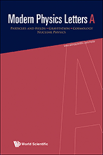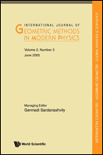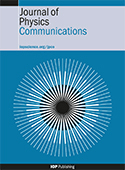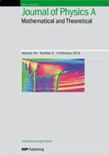
FOUNDATIONS OF PHYSICS
Scope & Guideline
Exploring the Intersections of Science and Philosophy
Introduction
Aims and Scopes
- Quantum Foundations and Interpretations:
The journal extensively covers various interpretations of quantum mechanics, including ontological and epistemic perspectives, examining foundational issues such as the nature of the wave function, measurement problems, and the implications of different quantum theories. - Philosophical Implications of Physics:
Papers often delve into the philosophical aspects of physical theories, addressing questions about realism, determinism, and the nature of reality in light of contemporary physics. This includes discussions on topics such as the implications of quantum entanglement and the nature of time. - Relational and Contextual Approaches:
A significant focus is placed on relational quantum mechanics and contextuality, exploring how these frameworks challenge traditional notions of objectivity and locality in physics. - Emergent Phenomena and Complex Systems:
The journal also investigates emergent phenomena in physics, particularly how complex systems can arise from simpler interactions, adding depth to discussions about statistical mechanics and thermodynamics. - Interdisciplinary Approaches:
There is a notable interest in interdisciplinary approaches that bridge physics with other fields, such as mathematics, cognitive science, and philosophy, fostering a broader understanding of physical theories.
Trending and Emerging
- Quantum Information and Computation:
There is a notable increase in papers discussing quantum information theory and its implications for quantum mechanics. This trend highlights the importance of information as a fundamental concept in understanding quantum systems and their behaviors. - Philosophical Perspectives on Quantum Mechanics:
Recent publications are increasingly exploring the philosophical implications of quantum mechanics, particularly in relation to realism, the nature of measurement, and the interpretation of quantum states. This trend underscores a growing recognition of the interplay between physics and philosophy. - Entanglement and Non-Locality:
Research focusing on entanglement and its implications for locality and causality is on the rise. This reflects an ongoing interest in exploring the foundational aspects of quantum mechanics and the challenges they pose to classical intuitions. - Emergence and Complexity in Quantum Systems:
There is an emerging focus on understanding how complex behaviors and emergent phenomena arise in quantum systems. This theme encompasses studies on quantum phase transitions and the role of entanglement in complex systems, indicating a shift towards recognizing the importance of emergent properties. - Stochastic and Non-Local Models:
Papers exploring stochastic models and non-local interpretations of quantum mechanics are gaining traction. This indicates a trend towards investigating alternative frameworks that challenge traditional views on locality and determinism, reflecting the ongoing evolution of quantum theory.
Declining or Waning
- Classical Physics Foundations:
Topics related to classical physics foundations, such as detailed explorations of classical mechanics or traditional electromagnetism, are becoming less frequent. The journal is increasingly focused on quantum and relativistic discussions, suggesting a waning interest in classical frameworks. - Deterministic Models in Quantum Mechanics:
The once-popular deterministic interpretations of quantum mechanics, such as those relying on strict causal models, are appearing less frequently. There seems to be a shift towards embracing probabilistic and non-deterministic frameworks, reflecting broader acceptance of quantum uncertainty. - Simplistic Ontological Models:
Simplistic or overly reductionist models that attempt to explain quantum phenomena without acknowledging their complexities are being phased out. The journal is increasingly favoring nuanced discussions that recognize the intricate nature of quantum systems.
Similar Journals

BRAZILIAN JOURNAL OF PHYSICS
Championing High-Quality Research in PhysicsBRAZILIAN JOURNAL OF PHYSICS, published by SPRINGER, is a prominent platform dedicated to the dissemination of research within the realm of physics and astronomy. With an ISSN of 0103-9733 and E-ISSN of 1678-4448, this esteemed journal has been contributing to the field since its inception in 1996, and it continues to be pivotal in showcasing innovative studies and breakthroughs. The journal is categorized in the Q4 quartile for the year 2023, reflecting a dedicated focus on advancing knowledge across a variety of disciplines, particularly in general physics and astronomy, where it ranks 126th out of 243 in Scopus rankings. Although it currently does not operate under an open-access model, it remains an invaluable resource for researchers, professionals, and students eager to enhance their understanding of complex physical principles and developments. The journal is committed to promoting high-quality research, bridging gaps in knowledge, and fostering collaboration within the global physics community.

MODERN PHYSICS LETTERS A
Bridging Theories and Discoveries in PhysicsMODERN PHYSICS LETTERS A, published by World Scientific Publishing Co Pte Ltd, is a distinguished journal in the field of physics that serves as a pivotal platform for researchers, professionals, and students alike. With ISSN 0217-7323 and E-ISSN 1793-6632, the journal has gained international acclaim for its contributions to Astronomy and Astrophysics as well as Nuclear and High Energy Physics. The journal is ranked in Q3 for both Astronomy and Astrophysics and Nuclear and High Energy Physics, showcasing its relevance in these areas, while also achieving a Q2 ranking in the broader category of Physics and Astronomy (miscellaneous). Spanning from 1996 to 2024, MODERN PHYSICS LETTERS A promotes open dialogue and dissemination of pioneering research findings and innovative theories. While the journal operates without an open access option, its rich content is easily accessible through various academic databases, ensuring that vital research is shared widely among the scientific community. Situated in Singapore, this journal plays an essential role in the continuous advancement of the physics discipline, fostering collaboration and knowledge sharing among global researchers.

INTERNATIONAL JOURNAL OF GEOMETRIC METHODS IN MODERN PHYSICS
Advancing Theoretical Insights Through GeometryINTERNATIONAL JOURNAL OF GEOMETRIC METHODS IN MODERN PHYSICS is a leading academic publication dedicated to the interdisciplinary exploration of geometric methods in the realms of modern physics. Published by WORLD SCIENTIFIC PUBL CO PTE LTD, this esteemed journal is based in Singapore and acts as a critical platform for researchers, professionals, and students seeking to delve into the intricacies of modern theoretical physics and its geometric foundations. With an impressive Scopus ranking placing it in the 64th percentile of its category, the journal highlights innovative research and developments from 2005 to 2024 within its scope. While currently not offering Open Access, it remains a vital resource for the dissemination of valuable knowledge in its field, contributing significantly to the advancement of physics and astronomy. We encourage the academic community to explore this exceptional journal for cutting-edge insights and to further enhance their understanding of geometric applications in modern scientific inquiry.

Journal of Physics Communications
Unlocking the Future of Physics ResearchJournal of Physics Communications, published by IOP Publishing Ltd, serves as a significant platform for the dissemination of innovative research in the realm of physics and astronomy. Since its inception in 2017, this Open Access journal has fostered a collaborative environment, allowing researchers, professionals, and students to share their findings and ideas without barriers. With an ISSN of 2399-6528, the journal has established its credibility in the academic community, achieving a ranking of Q3 in the 2023 category of Physics and Astronomy (miscellaneous), as well as a respectable position in Scopus with a rank of #122 out of 243 in its field. The journal's focus is on bridging theoretical concepts and practical applications, making it an essential resource for those engaged in the evolving landscape of physics. The Journal of Physics Communications not only aims to advance knowledge but also to inspire interdisciplinary collaboration, inviting contributions from diverse areas within physics. Authors and readers alike will find this journal particularly beneficial to stay updated on emerging trends and innovative research.

ANNALES HENRI POINCARE
Pioneering Insights in Statistical and Nonlinear PhysicsANNALES HENRI POINCARE is a prestigious journal published by Springer International Publishing AG, dedicated to advancing research in the fields of Mathematical Physics, Nuclear and High Energy Physics, and Statistical and Nonlinear Physics. With an impressive Q1 ranking in its respective categories as of 2023, this journal is recognized as a vital resource for academic researchers, professionals, and students engaged in frontier studies of theoretical and applied physics. The journal's commitment to high-quality peer-reviewed articles promotes significant contributions to the understanding of complex physical phenomena, making it essential reading for anyone seeking to stay abreast of developments in these dynamic fields. Additionally, ANNALES HENRI POINCARE offers open access options to enhance the visibility and accessibility of groundbreaking research, underscoring its role in fostering collaborative scientific inquiry and innovation. Since its inception in 2000, it has continually provided a platform for scholars worldwide to disseminate their findings and engage with the broader scientific community, thus establishing itself as a cornerstone of academic literature.

RUSSIAN JOURNAL OF MATHEMATICAL PHYSICS
Illuminating the Path of Discovery in Mathematical and Statistical PhysicsRUSSIAN JOURNAL OF MATHEMATICAL PHYSICS is a premier academic journal published by PLEIADES PUBLISHING INC, dedicated to advancing the fields of mathematical physics and statistical and nonlinear physics. With a commendable Impact Factor in the Q2 category for both disciplines as of 2023, the journal serves as an essential platform for researchers, professionals, and students to explore innovative theoretical and applied aspects of these fields. Established between 1996 and 1997, and resuming publication in 1999 through to 2024, the journal reflects a long-standing commitment to disseminating high-quality scholarship. The Scopus rankings place it at a competitive position, ranking #23 out of 85 in Mathematical Physics and #26 out of 62 in Statistical and Nonlinear Physics, showcasing its relevance and influence. While currently not offering open access, the journal’s audience is encouraged to engage with its substantive research and contribute to the ongoing dialogue in mathematical physics, fostering a deeper understanding of complex physical phenomena.

Quantum Studies-Mathematics and Foundations
Innovating the discourse in quantum mechanics.Quantum Studies-Mathematics and Foundations, published by SPRINGER, is an esteemed academic journal dedicated to advancing the field of quantum theories by providing a platform for the intersection of mathematics, physics, and foundational principles. Established in 2014, the journal has garnered a respectable impact factor within the academic community, reflective of its commitment to quality research, acknowledged in its Q3 ranking in both Atomic and Molecular Physics and Mathematical Physics for 2023. With a focus on groundbreaking studies that explore the subtleties of quantum mechanics and its mathematical underpinnings, the journal aims to foster innovative research and contribute to the discourse among researchers, professionals, and students alike. Although the journal operates on a non-open access model, it provides invaluable insights that bridge theoretical frameworks with practical applications in the quantum realm. The journal is located in a prime academic hub in Switzerland, making it a significant contributor to the global dialogue in physics and mathematics.

Frontiers of Physics
Unlocking the Future of Physics, TogetherFrontiers of Physics, published by Higher Education Press, is a premier open-access journal dedicated to fostering innovative research and excellence within the field of physics. With an ISSN of 2095-0462 and an E-ISSN of 2095-0470, this rapidly growing journal has established itself as a valuable platform for disseminating cutting-edge findings, covering a diverse range of topics from theoretical frameworks to experimental advancements. Notably, Frontiers of Physics has achieved an impressive Q1 ranking in the 2023 Scopus Quartiles for Physics and Astronomy, securing a competitive 5th out of 81 positions in its category, reflecting a high impact factor that underscores its importance to the scientific community. Since its inception in 2011 and continuing through 2024, the journal aims to bridge the gap between academia and industry, encouraging collaboration among researchers, professionals, and students alike. Its commitment to open access ensures that high-quality research is readily accessible, thereby promoting knowledge sharing and advancement in the global physics community. Explore the potential of your research in Frontiers of Physics, where the future of physics flourishes.

Journal of Physics A-Mathematical and Theoretical
Innovating Theoretical Insights for Tomorrow's DiscoveriesThe Journal of Physics A-Mathematical and Theoretical, published by IOP Publishing Ltd, is a premier peer-reviewed journal dedicated to advancing the understanding of mathematical physics, modeling, and simulation methods within the dynamic field of physics and astronomy. Established in the United Kingdom, this journal has made significant contributions over the years, maintaining a strong reputation as a Q1 and Q2 ranked journal across various categories, reflecting its influence in the scientific community. With a focus on innovative and theoretical approaches, it provides a platform for researchers, professionals, and students to disseminate their findings and engage with groundbreaking methodologies. Despite its lack of open access options, the journal's high impact factor and Scopus rankings, which place it in the top percentiles across multiple disciplines, underscore its critical role in fostering scholarly communication and collaboration in mathematical and theoretical physics. As we move through its converged years from 2007 to 2024, the Journal of Physics A continues to be a pivotal contributor to the landscape of contemporary physics, stimulating discussions and advancing knowledge in an ever-evolving realm.

European Physical Journal H
Charting the Course of Physics Through Time and ThoughtThe European Physical Journal H (EPJ H) is a distinguished peer-reviewed academic journal dedicated to the history and philosophy of physics, published by SPRINGER HEIDELBERG in Germany. With an ISSN of 2102-6459 and an E-ISSN of 2102-6467, the journal aims to bridge the gap between historical context and contemporary scientific advancements in the field of Physics and Astronomy. Although it holds a Q4 quartile ranking in the 2023 category for Physics and Astronomy (miscellaneous) and occupies the 161st position out of 243 in Scopus rankings, EPJ H has a vital role in facilitating discourse among researchers and educators interested in retracing the evolution of concepts and discoveries within physics. Emphasizing the importance of interdisciplinary dialogue, the journal provides open access options to ensure that its scholarly contributions are readily available to a global audience, thereby enhancing educational resources and research visibility. The timeline of publication spans from 2010 to 2024, making it an up-to-date resource for those exploring the intricate historical landscape of physical sciences.